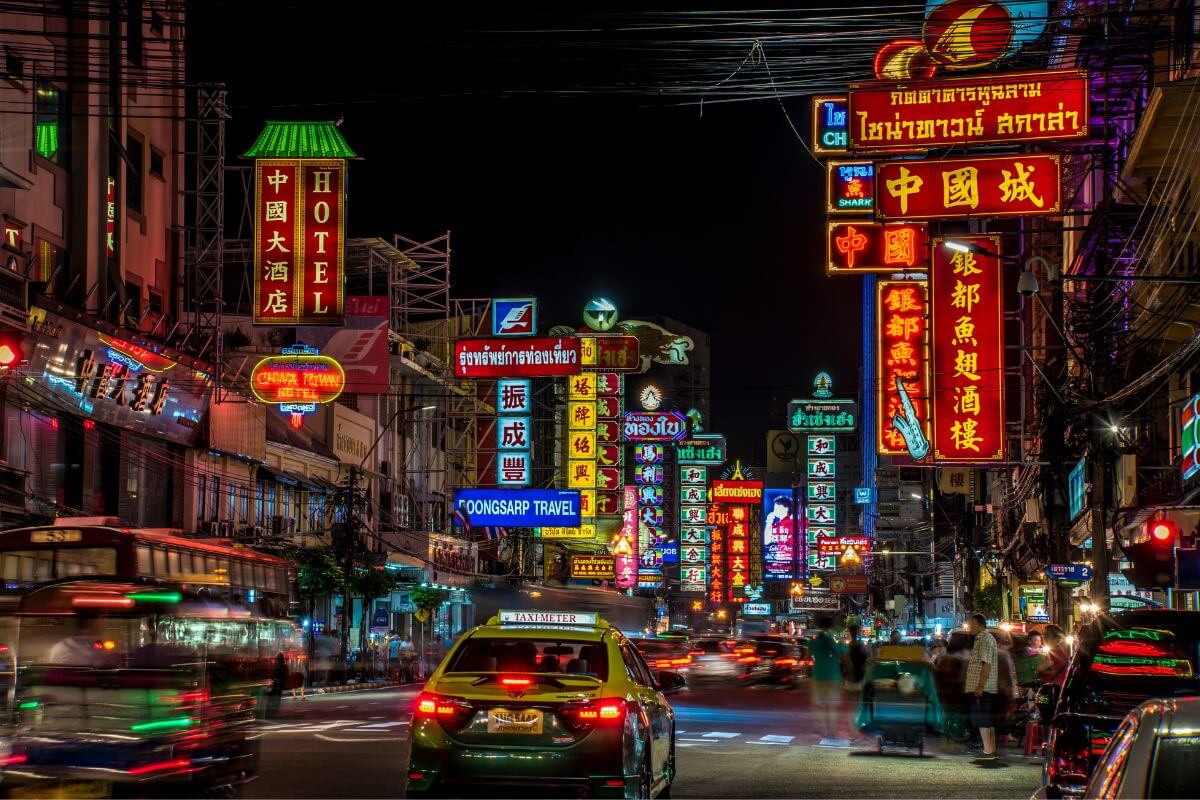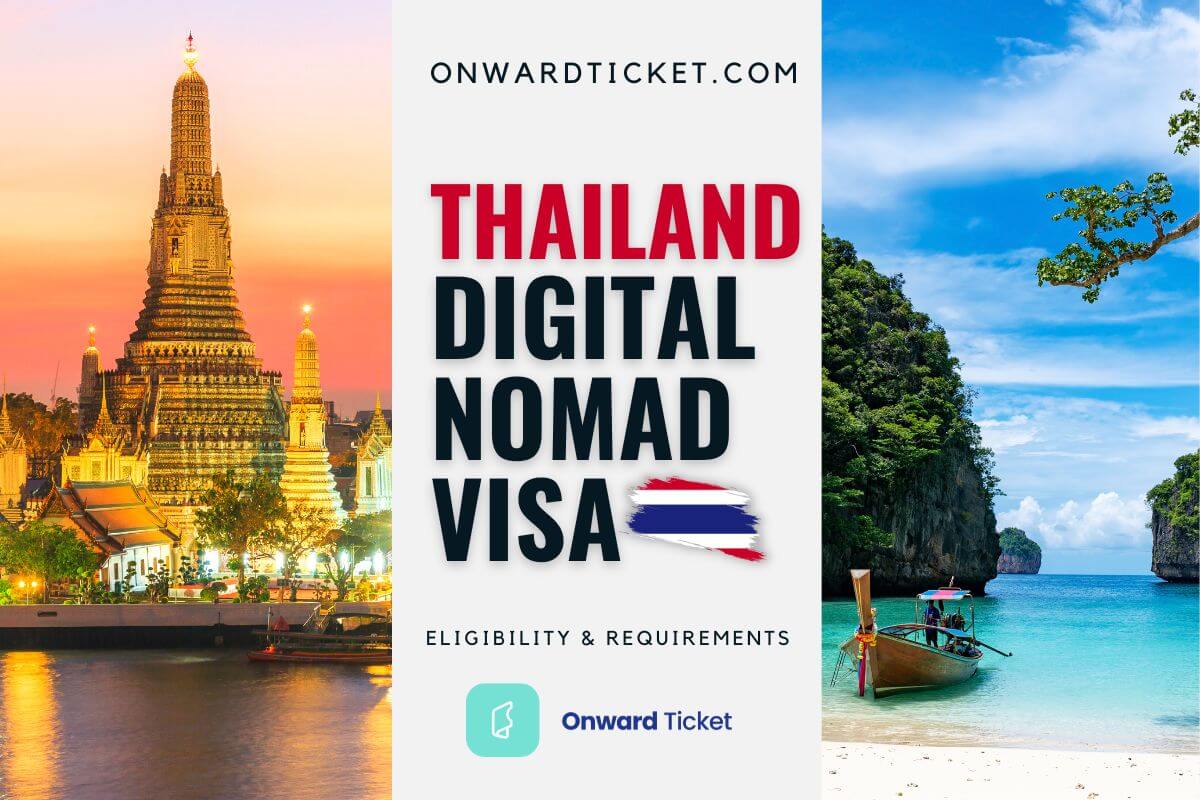There is no Thailand digital nomad visa yet, but the country introduced the Long Term Residency (LTR) permit in September 2022.
This program is primarily aimed at affluent, highly-skilled individuals for up to 10 years and not short-term digital nomads.
Despite this, Thailand remains a digital nomad haven with its low living costs, beautiful beaches, nice people and strong internet connection.
Let’s have a look at the different options.
Thailand Digital Nomad Visa - Key Points Explained

There is no specific Thailand digital nomad visa so you’ll have to get work permits for all work-related activities within the country, remote work by freelancers and self-employed people included.
But good news, Thailand offers a wide range of visas for different needs like tourism or investment.
The Thai Work Permit Office's criteria hinge on whether an activity uses energy, knowledge or effort to create something.
If you’re for example a digital nomad managing an online shop from a co-working space, you may not require a work permit, unless your business is primarily Thai-based.
Is It Hard To Get Digital Nomad Visa For Thailand ?
The country does not currently offer a specific digital nomad visa for Thailand, so compared to other countries with established digital nomad visas, Thailand's visa requirements require more strategic planning.
The complexity of what constitutes “work” and the necessity for a work permit create a less straightforward path than in many other countries.
But don’t worry, as we explain everything in this digital nomad visa in Thailand guide.
Digital Nomad Visa Thailand Types

There's no specific Thailand digital nomad visa, but several visa types offer pathways for remote workers and digital nomads.
Smart Visa for Digital Nomads
The smart visa Thailand digital nomad caters to professionals in key sectors, including digital nomads.
It offers different categories like Smart T for technology experts and Smart I for investors, which allows them to extend their stays and work privileges.
Not exclusively a digital nomad visa, the Thailand smart visa digital nomad accommodates some types of remote workers under specific conditions.
10-Year Long-Term Residency (LTR) Visa
Launched in September 2022, the LTR Visa targets affluent expats, including digital nomads, for a 10-year stay.
It's for you only if you significantly contribute to Thailand's economy (through investment, expertise or high income for example).
This 10 year visa Thailand digital nomad offers many benefits :
- renewable 10-year validity
- exemption from some employment ratio requirements
- and permission to work in Thailand
Tourist Visas for Short-Term Stays

If you’re not qualifying for the Smart Visa or LTR, tourist visas remain a practical option.
These include the:
- 30-Day Tourist Visa Exemption
- Visa on Arrival
- Single Entry Tourist Visa (SETV)
- and Multiple Entry Tourist Visa (METV)
You’ll be able to stay in the country for 15 to 60 days, extendable under some conditions. Unfortunately, these visas do not legally permit work. A sorta grey area.
Retirement Visas for Older Nomads
If you’re over 50, then you may consider Thailand's retirement visas. Those visas offer long-term stay options with financial requirements.
Thai Elite Visa
This is a long-term visa option that offers multiple entry access to Thailand for 5, 10 or even 20 years, along with additional perks.
Thailand Elite visa is an expensive option more suited for you if you’re looking for a luxury expat experience and you have lots of money.
Digital Nomad Visa Thailand Requirements & Eligibility

Have a look at the Thailand digital nomad visa requirements and eligibility criteria to make sure you’re eligible.
Here are the requirements for the Smart digital nomad Thailand visa :
- Identification : to prove your identity.
- Project Pitch Deck : required to demonstrate the potential growth of your project in Thailand.
- Government visa fees : approximately 10000 Baht (around $300), payable post-approval.
- Financial proof for renewal : setting up a Thai company and having around 600 000 Baht (approximately $20000) under your name.
- Professional profile : highly skilled workers, investors, startup entrepreneurs, executives and dependents of SMART digital nomad visa Thailand holders.
Thailand Remote Work Visa Income Requirements
The remote work visa Thailand requirements may sometimes include a minimum income requirement.
This isn’t the case for the Smart visa but it is for some, you might need to earn the equivalent of $80 000 per year.
These income requirements ensure you can sustain yourself financially in Thailand and contribute positively to the local economy.
Apply For Thailand Digital Nomad Visa With These Documents

Here is a list of all the documents you might need if you apply to a Thailand’s digital nomad visa equivalent or digital nomad work visa Thailand :
- Passport : original passport along with its copies.
- Board of investment notification : a valid notification letter from Thailand's Board of Investment to the Immigration Bureau.
- TM. 90 form : this form must be printed out on both sides.
- STM.6 form : two copies of this form are needed, printed out on both sides.
- Visa overstay penalties acknowledgment : a form acknowledging the penalties for overstaying a visa, printed on one-sided paper.
- Smart visa practices acknowledgment : a form outlining the practices for recipients of the Smart Visa, also printed on one-sided paper.
- Passport-size photo : a recent passport size photo (4 cm x 6 cm).
Thailand Digital Nomad Visa Application Process Step By Step

The application process for digital nomads is a systematic procedure that requires careful attention to detail.
Here's a step-by-step guide :
- Start by applying online. Submit your application on the official Smart Visa website.
- Ensure that your qualifications align with the criteria specified by the Office of the Board of Investment.
- After your qualifications are verified, you'll receive both technical and non-technical endorsements. The SMART Visa unit will issue a letter of qualification endorsement.
- With the qualification endorsement letter in hand, proceed to file for a SMART Visa at the Royal Thai Embassies or Royal Consulates.
- Once you have the result of the qualification endorsement, make an appointment for Smart visa issuance on the designated website.
- Attend your appointment with all the required documents filled out and signed.
- Upon approval of your visa, pay the visa fee per person before you collect your new visa.
- You can collect the visa at the Immigration at OSS in Thailand, or at a Thai embassy or consulate closest to you.
Renewal Process Digital Nomad Visas In Thailand
You must apply for a renewal of qualification endorsement through the Smart Visa Extension website at least 60 days before your current visa expires.
You’ll have to show updated documents that reflect continued eligibility and pay again the visa fee.
How Long Is Digital Nomad Visa For Thailand Valid For ?

Commonly used by digital nomads in Thailand, the smart s visa offers a range of one to four years depending on the specific category and individual circumstances.
The Long-Term Residency (LTR) Visa provides an even longer validity of up to 10 years. These long durations are great to fully enjoy everything Thailand has to offer.
Digital Nomad Visa Thailand Cost
It all depends on the type of visa you choose !
- For the Smart Visa, the Thai government visa fee is approximately 10 000 Thai Baht (around $300). This fee is payable after the visa is approved.
- The Long-Term Residency (LTR) Visa, which targets more affluent digital nomads, costs around 50 000 Baht, or around $1500.
- As for the Elite Visa, it’s one of the most expensive in the world with a cost of 1,5 million baht (more than $40 000).
Thailand Digital Nomad Visa Tax To Expect

Are you applying for a Thai digital nomad visa or a Thailand remote worker visa ?
Then you have to understand the tax implications before you move. Thailand has a territorial tax system, which means income earned within the country is subject to Thai taxes.
Digital nomads must declare income earned from Thai sources and may be taxed accordingly. For the Smart Visa holders, you’ll enjoy a flat income tax rate of 17% for highly skilled professionals.
How Long You Wait To Get Thailand Digital Nomad Visa
After submitting the online application and necessary documents, the approval process usually takes a few weeks.
Once the qualification endorsement is received, you have to schedule an appointment for visa issuance, which will probably add to the timeline.
Bringing Family With You
If you hold a Smart Visa, your dependents - spouse and children - can also be granted permission to stay.
You’ll have to submit additional documentation for each family member as part of the visa application : proof of relationship (marriage certificates for spouses and birth certificates for children) and every individual document needed.
Keep in mind the primary visa holder's financial stability and ability to support dependents will be considered.
Cost Of Living In Thailand

The cost of living in Thailand offers a great balance of affordability and quality, so it’s an attractive destination for digital nomads.
Here is a detailed breakdown of usual living expenses :
| Accommodation | Cost |
|---|---|
| Rent | 250 to 400 € / $270 to $440 |
| Buy | From 30000 € / From $33000 |
| Hotels | 20 to 50 € / $22 to $55 |
| BnB | 20 to 40 € / $22 to $44 |
| Food | Cost |
|---|---|
| Restaurant | 3 to 10 € / $3 to $11 |
| Groceries | 100 to 200 € / $110 to $220 /month/pers |
| Fast Food | 3 to 6 € / $3 to $6,5 |
| Transports | Cost |
|---|---|
| Train | Around 10 € / $11 per 100 km |
| Bus | Around 0,5 € / $0,5 per trip |
| Taxi | Around 1 € / $1,10 per km |
| Car rental | 20 to 30 € / $22 to $33 per day |
| Airplane | Around 90 € / $100 per domestic trip |
| Leisure | Cost |
|---|---|
| Day excursion | 20 to 40 € / $22 to $44 |
| Nightlife | 5 to 10 € / $5,50 to $11 |
| Museum / attractions | 2 to 10 € / $2,20 to $11 |
| Outdoor activities | 10 to 30 € / $11 to $33 |
You can also check the Cost of Living in Thailand here.
Is There Digital Banking In Thailand
Thailand's banking sector offers many digital banking solutions.
Leading local banks like Kasikornbank, Siam Commercial Bank and Bangkok Bank provide comprehensive online banking services.
You will be able to manage your finances efficiently : funds transfer, bill payments, monitoring account activity… Many bank applications will join your collection of apps for business expenses and organization.
Which VPN Works Best In Thailand For Digital Nomads ?
As a digital nomad in Thailand, you’ll have to choose the right VPN to secure and have access to unrestricted internet access.
Among the top contenders, NordVPN and ExpressVPN stand out for their reliability, speed and strong encryption standards.
NordVPN offers a big network of servers and ensures optimal connection speeds and stability, so we would place it as a top choice.
Popular Digital Nomad Hotspots (Cities) In Thailand

Not sure about where to move in Thailand ?
Here are the most popular hotspots for digital nomads with a Thailand visa.
- Bangkok - Thailand's capital is a magnet for digital nomads who wish to immerse themselves in a dynamic urban experience. Known for its eclectic mix of modern skyscrapers and historic temples, the city offers an exciting lifestyle with loads of coworking spaces.
- Chiang Mai - Chiang Mai is often hailed as the digital nomad capital of the world. This northern city is beloved for its affordable living, beautiful temples and cafes. It's a perfect blend of traditional Thai culture and modern amenities, with a lot of coworking spaces and a strong community of remote workers.
- Phuket - Thailand's largest island is a paradise for nomads who love the beach lifestyle. Known for its stunning beaches, clear waters, amazing snorkeling and diving spots and nightlife, Phuket also offers a lot of coworking spaces. The island is ideal for balance between work and leisure.
- Koh Samui - Koh Samui is another island favorite among digital nomads in Thailand. It boasts a relaxed yet connected environment. With beautiful beaches, warm climate and more and more coworking spaces, it's a great spot if you prefer an island lifestyle. The island is also known for its wellness and fitness retreats.
- Pai Pai - You’ll absolutely love this small town in the mountains of Northern Thailand. Known for its laid-back atmosphere, Pai offers a peaceful retreat from the sometimes overwhelming city life. Here coworking spaces are getting more and more numerous !
Are There Coworking Communities In Thailand

Are you craving to visit Thailand and join one of the most dynamic coworking communities in Thailand ?
Here are some of the best coworking communities we could find in Thailand.
Bangkok
Bangkok really is the hub for holders of the Thailand nomad visa and Thailand remote work visa.
Let’s make it clear : communities here are thriving !
The city is dotted with numerous coworking spaces and great collaborative environments like Common Ground G Tower or The Work Loft.
These spaces often host networking events and workshops which will allow you to meet new people.
Chiang Mai
Chiang Mai is another popular destination for digital nomads thanks to its impressive array of coworking communities like Alt_ChiangMai or One Workspace.
These spaces are not just about providing a desk : they offer a huge sense of community and connection. An ideal environment for networking and collaboration among digital nomads and local professionals.
Phuket
Good news : Phuket's coworking communities are as diverse as the island itself.
The Project, Nai Harn Space… All of its coworking spaces blend professional working environments with the laid-back and beachside vibe of the island. A great place to work and swim by day and party at night !
Is Thailand Safe For Digital Nomads ?
Thailand is quite safe for digital nomads, but like any destination, it's important to be mindful of some aspects.
One of the primary concerns is traffic safety, especially in major cities like Bangkok and Chiang Mai. Traffic can be chaotic and road safety standards may differ from what you're used to. So extra caution is advised, especially if you plan on renting scooters or driving.
For more peace of mind, don’t hesitate to secure travel insurance and compare SafetyWing and World Nomads, two popular choices among the digital nomad community.
Final Pros & Benefits

Wishing to become a digital nomad in Thailand ?
To work as a Thailand freelancer comes with numerous benefits and advantages.
The country offers a low cost of living and allows for a comfortable lifestyle without spending too much.
Let’s add high-speed internet access and a multitude of coworking spaces and we obtain an ideal environment.
Also, let’s not forget the warm climate, stunning beaches, beautiful temples and jungles and it’s just the perfect blend of work and leisure !
Few Drawbacks To Have In Mind
Yes, Thailand presents many opportunities for Thailand digital nomads and Thai freelance workers.
But there are a few drawbacks to consider.
- The lack of a specific digital nomad visa may indeed create legal gray areas regarding work permits and taxation.
- Also, language barriers are difficult to overcome, especially in more rural areas.
- The humid climate and cultural differences may take time to adjust as well.
3 Alternative Countries With Similar Requirements We Recommend

Not fully convinced by Thailand visa options ?
Here are some other countries with similar requirements we can recommend.
Vietnam
An excellent alternative if you’re considering a move similar to Thailand digital nomad life.
The Vietnam freelancer visa will allow you to enjoy the country’s growing economy, amazing culture and affordable living costs.
Vietnam offers a straightforward visa process for digital nomads and freelancers with options for long-term stays.
New Zealand
Though further afield, New Zealand is a great option for you if you’re looking for stunning landscapes and a high quality of life.
The New Zealand remote work visa is a great option to enjoy the country’s well-developed infrastructure and focus on work-life balance.
Cambodia
With its rich cultural heritage and lower cost of living, Cambodia is becoming increasingly popular among digital nomads.
The Cambodia visa for freelancers is a great option for long-term stays. You’ll absolutely love Phnom Penh and Siem Reap and their expat-friendly communities.
FAQs

No, Thailand does not have a specific digital nomad visa for now, but different visa options will do the work.
American digital nomads can stay up to 60 days on a tourist visa, extendable for another 30 days.
Thailand does not have a specific digital nomad visa but its visa options are actually quite simple compared to other southeast asian countries.
The Thailand Elite Visa offers long-term stay options (5-20 years). It’s suitable for some digital nomads but very expensive.
Only income earned in Thailand is taxable, so you should not be taxed as a digital nomad in Thailand.
It depends on the type of visa you choose. On a tourist visa, the maximum stay is 90 days, but other visas may allow longer durations.
Thailand does not offer permanent residency through any current digital nomad visa arrangement, but the Thai elite visa program allows very long stays.
Wrap Up
Thailand doesn't offer a specific digital nomad visa but its range of visa options and idyllic islands provide a compelling destination for remote workers.
The affordable cost of living and supportive expat community make it an attractive choice, despite the legal and tax considerations to keep in mind. A great choice if you seek adventure, work and leisure.





